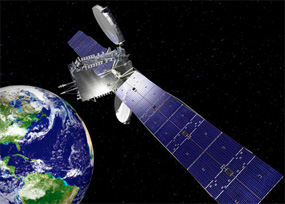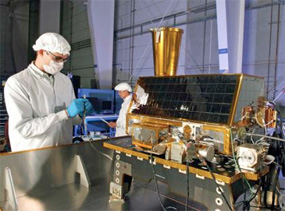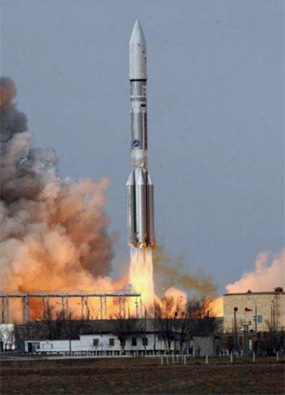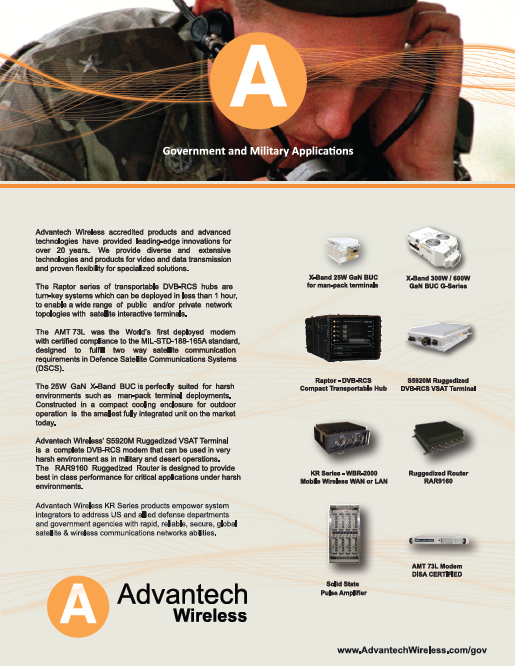With ongoing discussions surrounding the manufacturers, operators and integrators experience in the hosted payload arena, it’s important to note that the launch community is no stranger to this type of access to space.

Top: Artistic impression of the SES-2 satellite. Image courtesy of Orbital Sciences.
Whether commercially-hosted government payloads, or commercially-hosted commercial payloads, launch providers have been delivering these assets to space for decades. In some cases, certain launch providers could be deemed pioneers in the hosted payload arena.
In 2005, Arianespace launched the Wide Area Augmentation System (WAAS) for the Federal Aviation Administration, on board an Ariane 5 from Europe’s spaceport (CSG) in French Guiana. Then, in 2011, the Commercially Hosted Infrared Payload (CHIRP), a U.S. Air Force infrared sensor, was launched on the SES-2 satellite via Arianespace, again on an Ariane 5.
In 2012, International Launch Services launched Intelsat’s IS-22 satellite via a Proton rocket, which carried a UHF-hosted payload that serves the Australian Defense Force.
These missions all represent resounding successes, with the hosted payloads continuing to provide crucial services to government customers today. With each of these launches, the hosted payload model was vindicated.
With the responsibility of launching these payloads comes the expectation—and the absolute necessity—for significant security provisions. In the case of Arianespace’s French Guiana facility, the French Navy, Army and Foreign Legion, and the Gendarmerie (national police) form several impenetrable security layers around any launch campaign that occurs within the CSG.

CHIRP, the U.S. Air Force experimental missile warning sensor aboard the SES-2 satellite. Photo courtesy of SES.
Other tight security protocols strictly control access to any spacecraft resident within the base’s preparation facilities and provide 24 hour monitoring of sensitive technologies. Badging check-points are a must, and when needed, an enhanced security regimen is also part of the overall launch plan.
These activities are an integral part of being a trusted partner in the satellite launch industry. Moreover, all of these steps are taken in order to practice strict adherence to U.S. export control laws, rules and regulations.
Question for HPA members:
How should policy evolve so foreign launches of U.S. Government payloads can take better advantage of trusted launch providers?

“Our customers have proven that there are no barriers to launching a hosted payload on ILS Proton—whether it has a civil, military or other sensitive government application. In fact, the majority of ILS Proton launches within the past twelve months were either hosted payloads or dual-use payloads for a wide range of customers from all corners of the world. U.S. policies may need to be adapted or modified to include this cost-effective and schedule efficient launch solution very early in the program development process. This would enable all parties involved—from the launcher, the satellite manufacturer, operator and integrator—to properly assess the technical feasibility as well as the benefits, of commercial launch.”—Dawn Harms, Vice President of Marketing, Sales and Communications, International Launch Services (ILS)

“A waiver is currently required to fly on foreign “trusted” launch vehicles. As the United States government evolves to utilization of Hosted Payloads, such as through the U.S. Air Force’s Hosted Payload Solutions (HoPS) initiative, foreign launch vehicles will inevitably be used due to the primary commercial host satellite and launch vehicle selected. Because of this, a more streamlined waiver process is needed.”—Jim Simpson, Vice President Business Development, Boeing Space & Intelligence Solutions

“Remove the language from the U.S. Space Transportation Policy that requires U.S. Government payloads to be launched on space launch vehicles manufactured in the United States. Most trusted launch providers fit within the comfort zone of U.S. diplomatic strategies and support U.S. interests for free market economics, sound security measures, and technology safeguards. Opening up the launch vehicle market internationally for U.S. Government payloads will foster healthy competition and drive down costs, which benefits U.S. Space Acquisition and the U.S. taxpayer in today’s fiscally constrained environment. Policy must change now so the U.S. can afford to modernize U.S. Space capabilities through the employment of timely, resilient and disaggregated space architectures that will only be possible from a wide range of Space Launch choices.”—Eric Moltzau, Senior Principal Director, Intelsat General Corporation

The launch of the Intelsat IS-22 by International Launch Services (ILS). Photo is courtesy of ILS.

“An update to the U.S. Space Transportation Policy, last published in 2005, is nearing completion. This policy update will likely allow a limited set of U.S. Government offices to take advantage of capabilities offered by trusted launch providers while continuing more stringent approval requirements on other payloads. If that is the case, the change didn’t go far enough. The current U.S. export control laws provide ample protection for U.S. technology and hosted payloads should be treated no differently. SES, Orbital, SAIC, and Arianespace proved that launching classified hardware from French Guiana can be done. During the launch preparation for SES-2 and the Commercially Hosted InfraRed Payload (CHIRP), we had to make only minor changes to Arianespace’s standard procedures to launch hardware classified at the DoD secret level. As the U.S. expands its international outreach in select National Security programs like WGS, AEHF, perhaps it is time to include launch in those discussions also.”—Tim Deaver, Vice President, Corporate Development, SES Government Solutions

“While it doesn’t seem as though hosted payloads have been around very long, the truth is that the U.S. government has been hosting various payloads on satellites for 50 years. Commercially hosted payloads bring a unique set of requirements for security, ITAR, IP protection, and other considerations. The mission is always the first concern whenever the U.S. government contemplates launching a hosted payload, for there can be little room for error when the nation’s interests are at stake. The current process already allows for commercial hosting. By definition it is not easy, since the interests of the commercial host and the payload provider often differ. The current process already assesses against these factors, so major changes seem unwarranted. Furthermore, many other governments have policies that limit the field of launch providers, so greater access domestically should be balanced with greater access into the international market. Finally, the U.S. government has evaluated non-U.S. launch services because of the perceived shortage of commercially available U.S. launchers. Space-X, Orbital Sciences, and Lockheed Martin are all on a path to provide plenty of affordable indigenous lift, thus fulfilling any perceived gaps.”—Robert R. Cleave, President, Lockheed Martin Commercial Launch Services

“Arianespace is a proven, trusted provider of launch services for the commercial space sector. Recent successes by SpaceX’s Falcon 9 and Orbital’s Antares indicate there will soon be two new affordable American options for commercial space lift. However, [until these new launch service entrants establish routine operational tempo] the commercial world will remain predominantly reliant on foreign launchers. Currently, U.S. Space Transportation Policy requires that the White House Office of Science and Technology Policy (OSTP) along with the National Security Council (NSC) grant an exemption when U.S. Government payloads are planned to be launched on non-U.S. rockets. Consequently, it is very important that U.S. Government sponsors of commercially hosted missions seek this exemption very early in the planning cycle to legitimize the hosted payload mission concept before formal Analyses of Alternatives are commissioned. By the same token, OSTP and the NSC should have the authority to grant exemptions at least on a conditional basis during this early concept forming period. We hope that the policy will be modified to be more transparent and to provide for time limits on the government’s exemption deliberation process.”—Dave Anhalt, Vice President + General Manager, Iridium PRIME

“The U.S. Government should lift policy restrictions that keep federal agencies from using foreign commercial launch services, within the confines of export licensing regulations carried out by the U.S. State and Commerce Departments. This assumes we’re talking about U.S. policy and non-U.S. launch of U.S. Government payloads. The hosted payload builder and Government team should weigh the program cost benefits of a potentially lower cost hosting and launch with the cost of additional security at both the host integration facilities and launch base. While it may have served us well in the past to guarantee a customer base for U.S. launch providers, there is little need for explicit policy as the export licensing process should suffice. There are launch nations that will not pass government scrutiny, of course, with North Korea and China among them. But NATO-member nations and others with which we have close alliances could be acceptable. Let the market and negotiations determine the best deal where there are not overriding technical and security constraints.”—Tim Frei, Vice President, Communication Systems, Northrop Grumman Aerospace Systems

For further information regarding the Hosted Payload Alliance, please access their website http://www.hostedpayloadalliance.org
About the author
Aaron Lewis, Director of Media and Government Relations for Arianespace has been with the company since 2004. Previously he served for a decade in the U.S. House of Representatives in various policy and communications strategy roles. He has a degree in Classics and the History of Math and Science from St. John’s College, Annapolis, Maryland.


